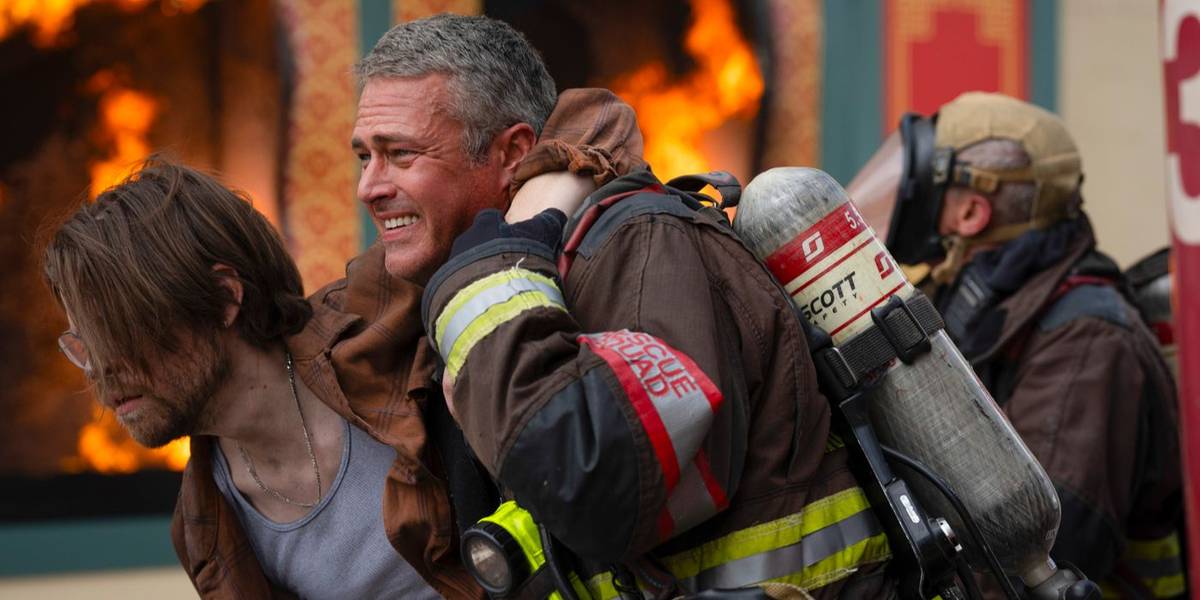
As Chicago Fire prepares for its fourteenth season, fans are grappling with the unexpected departures of Daniel Kyri and Jake Lockett—two cast members whose exits have sparked controversy, confusion, and passionate online protests. But while fans mourn the loss of Darren Ritter and Sam Carver, the show’s producers and network executives are facing a different kind of challenge: how to keep a long-running hit alive amid rising production costs and shifting television economics.
NBC’s Quiet Cost-Cutting Strategy
NBC has not made any grand announcements about scaling back, but signs have been building for some time. Insiders confirm that the decision to let go of Kyri and Lockett was part of a broader strategy to reduce expenses across the entire One Chicago franchise, which also includes Chicago Med and Chicago P.D.
Each of these shows operates with a large ensemble cast, complex location shoots, and demanding technical effects—particularly for Chicago Fire, which regularly features large-scale stunts and explosive fire rescues. By trimming the roster of series regulars, the network lowers its per-episode production cost and frees up space for rotating guest stars or bigger crossover events.
“It’s not personal—it’s economics,” said one industry insider. “NBC wants to keep all three One Chicago shows running, but something had to give.”
A Franchise Under Pressure
While Chicago Fire remains a ratings winner for NBC, the landscape of network television has changed drastically in the last five years. Competition from streaming services, declines in linear TV viewership, and rising labor costs have forced traditional networks to get leaner and more strategic.
The One Chicago universe, once a symbol of NBC’s scripted dominance, now finds itself under pressure to evolve. Ratings are still strong compared to other network dramas, but viewership is no longer growing. Meanwhile, production costs continue to climb.
By letting go of two cast members, NBC is signaling a shift toward a more flexible model—one that may rely more on guest appearances, recurring characters, and tightly written arcs instead of the sprawling ensemble approach that has defined the franchise until now.
Fallout From the Fans
While the move may make sense on paper, fans have been quick to point out the human cost of these decisions. Daniel Kyri, who played one of the few openly gay Black men on network television, was praised for his authenticity and warmth. Jake Lockett brought depth to Carver, a tough character with a slow-burning redemption arc.
The backlash on social media has been intense. Hashtags like #JusticeForRitter and #KeepCarver began trending after the announcement. Many longtime viewers feel betrayed by the network’s perceived disregard for character continuity and inclusive storytelling.
“They say it’s about money, but it feels like they’re cutting heart from the show,” one fan posted on X.
Inside the Writers’ Room

Sources close to the showrunners say the writing staff was informed of the cast changes late in the Season 13 production schedule. While it allowed time to set up a potential farewell for Ritter and Carver, the writers were reportedly instructed to keep things “open-ended” in case either actor returns in a guest capacity.
That ambiguity may frustrate fans who want closure, but it reflects a larger industry trend: keeping doors ajar in case budget conditions improve or viewership demands change.
“They may be gone for now,” said one writer anonymously, “but nobody’s ever really gone in the One Chicago world.”
What Does This Mean for the Future?
Season 14 will serve as a test—not just for Chicago Fire, but for NBC’s entire approach to franchise storytelling. Can the show maintain its emotional impact with fewer regulars? Will new characters resonate as deeply? Can a tighter, more economical version of Chicago Fire still feel like the show fans fell in love with?
Much will depend on how the writers balance the budget realities with creative ambition. There’s potential for powerful new arcs, emotional reinvention, and yes—even the return of old favorites down the line.
One thing is certain: the firehouse is changing. But its legacy—built on loyalty, sacrifice, and the bonds between firefighters—remains unshaken.